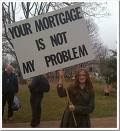 Charity is at the heart of the Church’s social doctrine. Our responsibilities and commitments to each other are spelled out by that doctrine which at its core is about loving one’s neighbor.
Charity is at the heart of the Church’s social doctrine. Our responsibilities and commitments to each other are spelled out by that doctrine which at its core is about loving one’s neighbor.
So that’s why when I see signs like the one above saying “Your mortgage is not my problem” and articles and columns detailing similar ideals my mind reacts negatively because I know that I am my brother’s keeper. So, in short, I know that their mortgage is my problem.
I think that’s one of the main reasons that the Democratic Party is so enticing to so many Christians. They hear of people in pain and the only party talking of doing something…anything about it is the Democratic Party which…let’s face it… has marketed itself successfully as the party of compassion. The party that cares about the poor. Or to put it bluntly, the party that says your mortgage is everyone’s problem. It all feels very Christian if you ignore the fact that the government is forcibly taking people’s money from them to establish another version of the Department of Motor Vehicles which will employ political toadies with responsibility to no one but their patron party bosses.
The Republican Party on the other hand has a strong streak of libertarianism running through it. And those ideas are often promulgated with a heavy emphasis on freedom. But the connection that conservatives have to charity and love for the poor is often left undiscussed. And without that I fear the Republican Party will continue to lose the social justice voters.
When I see signs like “Your mortgage is not my problem” that’s a problem for me. Look, I know what they mean. It’s a reaction to collectivism. And collectivism worries the heck out of me. I’ve read studies that seem to show that conservatives give more money to charity than liberals. But I think Republicans need to talk more about why freedom is good for everyone including the poor. I think the GOP needs to not only the party of that stirs a passion for freedom but the party that inspires compassion for all. And I’m not talking about the “compassionate conservatism” of George W. Bush who simply meant more big government but not quite as big as Barney Frank would like it.
I know that in societies with big government, people witness their neighbors in trouble and they shake their heads and say in pitying tones “The government should really have a program to help those poor people” rather than just helping people out themselves. In societies with big government the people in trouble tend to feel like they’re owed help and that when they receive help from the government they’re often ungrateful and ask why the government can’t do more. So we end up in a situation where the people who had the money taken from them are angry and the people who eventually received the money are ungrateful. Who does that help?
A free society must inspire those with to help those without. A free society that is to remain a free society must accept that someone else’s mortgage is their problem.

Leave a Reply